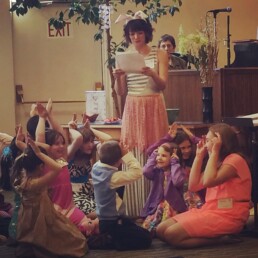
Worship Theory
What is “worship,” in a Unitarian Universalist context? What can we worship, when what binds us to one another is not our shared religious beliefs, but a covenant of Love?
There is some question among theologians as to the proper origin of the word “religion.” Some say it comes from the Latin, religare, “to bind.” Some say it comes from the Greek: releger, “to heed.” Still others claim it comes from the Tuetonic – rak, “to have a care for.” I say, I let us embrace all of these. Religion is a way of seeking meaning not alone, but within the context of relationship. To worship is to be bound together with others to heed wisdom and to have a care for what is meaning-filled. It is to be a part of the creation of Beloved Community, and to seek what is most worthy – together.
From this understanding arises my approach to worship. I have a passionate appreciation for the bravery and strength of those folks, especially 50-60 years ago, who looked out at the religious landscape of the time and felt deep in their bones that it did not suffice. Where was the place of reason? What might a more rational approach to the questions of life look like? How might we come together to seek a common ethic without ascribing its origin to an unknowable supernatural something? And further, must there be priests to navigate this place of meaning-making? From their efforts, a multitude of Unitarian Universalist congregations or “fellowships” were born, and humanism was centered. And still today, many of our people are those who seek no appeal to the supernatural. This world is quite enough.
At the same time, we know that when it comes to determining what is worthy of our attention and what builds meaning in our lives, it is not only our rational processes that speak. Our hearts feel; our wisdom arrives through other doors than the rational mind alone. And while in the past, the majority of our members were “come outers” from another tradition, frequently burned or disillusioned by the creeds or practices of their former faiths, now we gain many who have never known church life, who hunger for language that invokes reverence and awe, one that allows them to respond emotionally to questions of meaning while not offending their reason. Both/and.
Alongside all of this is the question of true diversity. We have long claimed to want to be genuinely open and welcoming faith communities, while the forms, structures, norms and makeup of our congregations and worship have been predominantly white and with strong class biases — toward the most literate, toward those with more leisure time and more disposable income. Most UU congregations are working hard to understand how these things affect who they are and how they are able to genuinely welcome. We work hard to create the conditions for a more radical welcome and inclusion. This means our music, our liturgy, who stands before us, how we make decisions and with what boldness we are willing to proclaim a prophetic truth all are changing. In worship, we show who we are and what we value. Worship must have the bravery and the flexibility to respond to the needs of a broken and changing world and all its children, while holding fast to the values and principles and the covenant by which we live.
And lastly, though not least, in my theory of worship there lies a final fundamental conviction: that ministry is shared. Ministers, by training and by covenant in congregational relationship, are responsible for the quality and the life of pulpit worship. But without full engagement with the people they serve, and without the voices of the people lifted alongside the voice of their called Minister, worship cannot thrive, it will not represent. I am looking for a people who play, sing, laugh, learn, dance, use theatre and whose worship life is shared in a lively flow between minister and congregation, with a strong, trained Worship Associate program and excellence in both professional and lay-led services. I hope to serve with talented musicians who embrace a wide range of musical styles, understanding that music is a main driver of congregational growth and that too much reliance on only one form of music or one hymnal or singing style is a powerful negative growth driver and undermines the power of worship. I l am eager to serve with an open, responsive community of people who love Sunday morning, and who may also long for or already deeply value other worship or reflective times of gathering. We can only discover what is worthy of our attention and care together.
